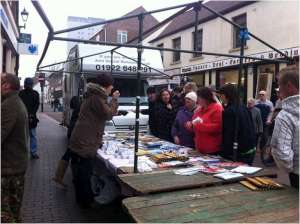Would markets be used more if they were open longer? Part 3; Weaknesses.
Continued from part 1 & part 2, in this blog I will speak and touch up on the weaknesses of the market being open longer, by speaking about trial and error, performance, lack of traders and popularity.
The weaknesses, in my opinion, in having markets open longer would have to be the following:
Trial and error: The idea has not been tested and without the idea being tested the idea can’t be projected, thus the outcome can’t be roughly predicted which means our traders would be entering no mans zone. This would be a very high risk for traders/operators to pay for extended market hours if nobody was to turn up.
If they were to open longer it could be a weakness as this is not something that has already been done in the UK which means the shoppers are not used to it. So, like any new start up this would take a bit of time, require a bit of patience and consistency to get off the ground and running which not all traders do.

Performance: In the West Midlands area there are a few markets underperforming in my opinion as opposed to years back when they were thriving and when I say west midlands let it be noted I am thinking within the black country region and outskirts such as Wolverhampton Market, Wednesfield Market, Willenhall Market, Dudley Market etc. Now this is to do with the lack of support they are receiving as well as the lack of diverse products available on these markets, along with big supermarkets opening up nearby, according to some traders I have spoken to.
But if a market is not performing in its peak times there are high possibilities that it is not going to perform in the extended hours unless there is something unique about that market. It is clear that before making the extension of market hours, maximising the performance in the peak times would be a must.
Lack of traders: Again I have to relate to the markets of the west midlands (some not all), but markets are barely full especially those I mentioned when speaking about performance. This could be because of rent rises as that money is not going back into the market in terms of improvement in some cases, but if we can’t fill out our ‘prime time’ day time markets how do we expect to fill out an extended hours market if we are struggling in the day?

Popularity: If the markets were to be open longer, or in the evening I think the shoppers of a later market would be a younger generation, as many shoppers have families and will be in looking after their children getting them ready for bed, cooking etc. Some may be a bit more elderly and don’t really like to go out in the evenings due to many downfalls of our society today and risks, which would also mean the new shoppers would be a younger generation.
But how would we attract this generation when we can’t attract them to our daily markets? Some may have some young shoppers but not every market does, in most market cases I would guess that the average shopper is over the age of 25, which makes this a weakness for markets to be open longer or on the evening as they would need to scheme a plan to attract the younger trader as well as trial it.
In conclusion to what I have said, I have listed many weaknesses but I would still say this is not enough to not give this opportunity a try as the saying goes, ‘don’t knock it until you try it’. I do still think this is worth trying as long as the solutions can be found to counteract the weaknesses, as well as the many strengths which I will conclude this series of blogs with in part 4.
Please note pictures were obtained from the following links people-results & Media cache & walsall
Markets play a vital role in driving local economies and as such therefore being largely available to the local communities and visitors.
However have you considered that markets specifically opening traditional market hours during the week can only ever rely on customers from a small base, depending upon the employment of that area. Hence why many are quiet due to a limited customer base as a significant part are at work and dont even know the market may exist. Whereas on an evening there are a greater part of that community available to potentially use the market. The question would also be do markets need to continue to trade traditional hours of 9-4 (where most traders go by 2) thus significantly reducing the impact upon the local economy.
LikeLiked by 1 person
Totally agree johnny, but even if it is the case of a small custom base due to employment, that is a valid reason for those people not to attend so maybe there should be a strategic focus on attracting those whose circumstances are different i.e younger traders, pensioners, flexible working hours employees, stay at home parents etc… for the traditional hours to increase trade and bring the market to their attention.
How ever in the strenghts part 4 (due to be released), i mention that this is beneficial for those who work 9 to 5 and i think it has been briefly mentioned in the opportunities part 1 also, that being said i think all you have said is bang on, as we like to say in my part of the midlands.
LikeLike
For Markets to deliver to the community the serve there needs to be a better understanding of the demographics of that area by the operator to fully understand who the market is being pitched at. This also needs to be backed up by consultation of that community to identify; A) the need or importance of that market and B) What that community expects from that market.
This could also include spending habits, travel distance etc But a more knowledgable and equipped operator is then more suitable to adapt and also be instrumental in changing trader habits and trading times to suit.
LikeLiked by 1 person
So how would you approach this? Compulsary Market operator training courses for council run markets? as some are just in it for self benefit instead of benefitting the market itself and traders and some are excellent and in return have great markets.
And again i would have to agree in terms of understanding who the market is being pitched at, as this would help identify those who are not targeted also, which then gives a better understanding as you mentioned and makes it easier to implement tactics to make the market more appealing to a general audience in order to maximise that markets profits as well as retaining targeted shoppers.
LikeLike
Historically Market Officers were trained professionally and had its own nationally recognised training body, the Institute of Market Officers. Officers had to sit examinations, oral panels and write assessments prior to becoming a qualified Market Officers. Which was the then requirement to be a Market Manager. There are only a handful of those qualified market officers still working within the industry as the Institute folded in 2005 and for several years there was no route to train market officers other than on the job. The role of the Market Officer is a very varied one and requires a great deal of knowledge as it not merely just about allocating a stall to a trader and collecting the rent. Subsequently NABMA developed a regime of training which is now contained in the Diploma of Markets Administration. 70 Market related employees have passed this qualification in the past three years which demonstrates that a more professional approach is now being undertaken.
I am afraid that we will disagree in relation to Market Officers as the majority of Market Officers I meet and know are often quite selfless in relation to their markets and will always go that extra mile for the benefit of the market. However a majority of Markets are under the control of Local Authorities and I will agree with your previous blogs that largely these markets have been used as ‘cash cows’ milked for all their worth to support local communities in a different way by propping up the Councils operational finances. Rather than reinvesting and growing the markets which then becomes debilitating to that Market Officer who is basically shackled in fulfilling the perceived requirements of the traders and public alike.
Markets have to evolve and hence why the NMTF joined forces with NABMA to launch the Mission for Markets in an attempt to collate best practise and steer markets into the 21st century.
LikeLiked by 1 person
Pingback: Would markets be used more if they were open longer? Part 4: Strengths – Market Shoppers